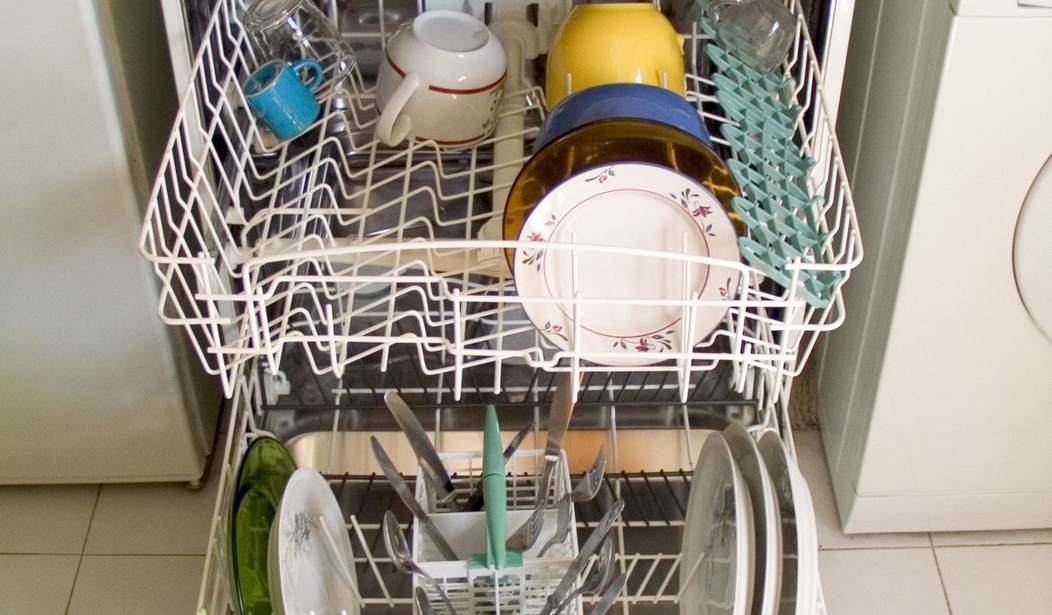In 1978, the average dishwasher only took an hour to wash plates, cups, and silverware. By 2014, the average time had increased to between 2 and 3 hours, despite advancements in technology. The culprit? Federal regulation. Yet on Tuesday, the Department of Energy (DOE) under Secretary Rick Perry granted a petition to consider new standards to make dishwashers great again. More than 2,000 Americans supported the petition, launched by the Competitive Enterprise Institute (CEI).
“CEI’s petition, for dishwashers that benefit consumers by cleaning fast and well, was supported by an avalanche of comments from individual Americans who were fed up with today’s slow, lousy models,” CEI attorney Devin Watkins said in a statement. “This situation is the result of government so-called ‘efficiency’ rules that, over the years, have more than doubled the time that dishwashers take to operate.”
When DOE granted the petition, it began the process of drafting a new rule. “We hope that its newly-announced rulemaking proceeding will end up improving consumer choice, allowing people to purchase dishwashers that clean quickly and well,” Watkins said. “We thank the Department for listening to the voices of those whom the agency should serve—consumers.”
Dishwasher cycle times doubled under increasing DOE regulations on the use of water and water temperature. Using data from Consumer Reports, CEI compiled a graph showing the increase in dishwasher cycle times correlating with tougher regulations.

Competitive Enterprise Institute graph of increasing dishwasher times with federal regulations, based on Consumer Reports data.
In 2016, DOE acknowledged that manufacturers make dishwashers slower to comply with federal regulations. “To help compensate for the negative impact on cleaning performance associated with decreasing water use and water temperature, manufacturers will typically increase the cycle time,” the agency admitted.
The Trump administration’s decision to act on CEI’s petition represents clear progress for consumer choice and America’s families. While the agency is not dropping the previous rules that forced manufacturers to slow down their dishwashers, the new rules will allow newer models that run more quickly by using more water and electricity.
“The DOE decision to add this new class of dishwashers will substantially expand the availability of dishwasher choices to the consumer,” Watkins told PJ Media on Wednesday. “Currently there are only two dishwasher regulatory standards, a compact and a standard dishwasher standard. This means most dishwashers are under a one-size-fits all limit that the amount of water and energy dishwashers use.”
“A change like the one DOE just granted could present substantial new options for consumers looking to get a dishwasher that can clean dishes quickly for consumers,” he added. Thanks to this new rule, “we have the potential to vastly improve the options to consumers to clean dishes quickly.”
As part of the consideration process, DOE published the proposed rule, allowing Americans to comment on it. A whopping 2,297 Americans commented on the rule, almost entirely praising it.
“Make dishwashers great again. It should not take 2-3 hours to clean a dishwasher full of dirty dishes,” Laurelle Hess wrote.
“Please bypass the restrictive environmental restrictions that prevent appliances from working appropriately. Its ridiculous that they do not clean or work like they did in the old days because of some stupid rule! Get rid of the regulations that prohibit proper use,” Mary Linne wrote.
Robert Terrell took a different approach. “We own an older deluxe machine. It’s about 40 years old. It still works like new, and it gets our dishes clean in about an hour on the Normal setting,” he wrote. “I am hoping it continues to work well so that we aren’t forced to replace it with a POS ‘newer’ machine! … Why are we losing ground here?”
“PLEASE give us back dishwashers that actually CLEAN our dishes!” Priscilla Kennedy wrote. “My old dishwasher actually DID just that and I was very happy…the entire cycle (full wash) took about 40 minutes and dishes (and pots) came out clean! Now my new dishwasher (top of the line mind you) takes almost 90 minutes and dishes don’t even come out clean after all that time and water usage (I pay for my water so this makes the use of my new dishwasher even more prohibitive).”
“PLEASE MAKE DISHWASHERS (and washing machines) GREAT AGAIN! It doesnt save electricity or water if I have to do my dishes right clothes twice to get them clean,” Paul Motolo wrote. “Im tired of dirty dishes and clothes.”
While this rule change may seem small and relatively inconsequential, it impacts thousands of Americans — and many of them are well aware of the problem. Sadly, the DOE under former President Barack Obama actually considered imposing newer, more strict regulations, which would have made the problem even worse. Obama’s DOE wisely dropped this approach because it would make dishwashers even worse for Americans.
It seems that 2020 Democratic presidential candidates like Sen. Bernie Sanders (I-Vt.), former Vice President Joe Biden, and Sen. Kamala Harris (D-Calif.), with their plans to throw gobs of money at the exaggerated threat of climate change, would double down on the plan Obama’s DOE rightly rejected.
Trump’s DOE may make dishwashers great again, but it seems the modern Democratic Party would push more regulations. This is in keeping with Trump’s general strategy. In 2018, his administration issued the fewest new regulations since records were first kept in the 1970s.
Suffering under red tape, Americans have to wait twice as long for dishes that are half as clean. Trump’s administration is finally addressing this issue. Under another Democratic president, the petty tyranny of long dishwasher cycles is only likely to get worse.
Follow Tyler O’Neil, the author of this article, on Twitter at @Tyler2ONeil.









Join the conversation as a VIP Member